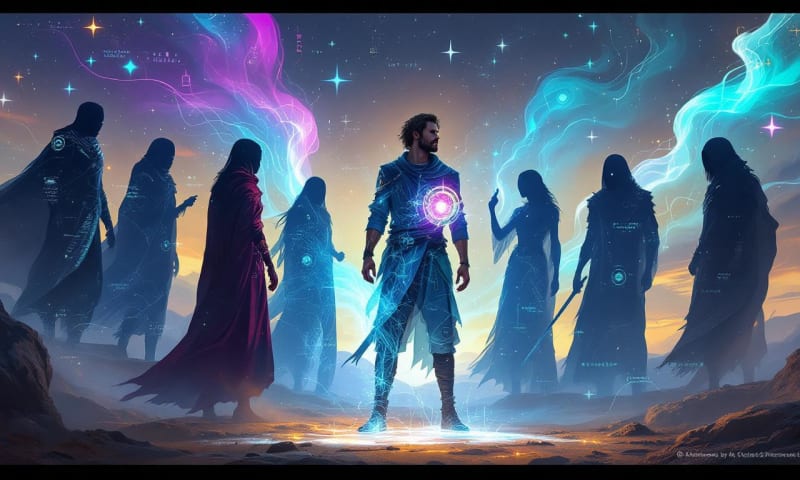Introduction
In the world of quantum physics, there exists a curious phenomenon that challenges the linear notions of time we've grown accustomed to. Imagine a world where the choices we make now, not tomorrow, not in some ethereal afterlife, but here and now, somehow ripple backward, altering events in the past. This isn't the stuff of dystopian fantasies or the latest science fiction series, it's a genuine puzzle posed by the strange behaviors of particles in quantum physics.
Simultaneously, C.S. Lewis, the revered British author and thinker, offers a mirrored insight into human life that, albeit clothed in the garments of spiritual and moral reflection, echoes this quantum curiosity. He speaks of a transformation, a kind of temporal alchemy, where present choices color our past in shades of either glory or despair. This interplay between Lewis's philosophical musings and the realities of quantum mechanics creates a rich tapestry worth exploring, not just for the intrigue, but for the insights it offers into our own lives.
Exploring Quantum Effects
To understand the concept of how the present might influence the past, we must first delve into the peculiar realm of quantum physics. At the quantum level, the universe behaves in mysterious ways, with particles that don’t conform to the straightforward rules of classical physics. Among these puzzling behaviors is a phenomenon known as the "quantum eraser" experiment, which seems to suggest that choices made in the present could, bizarrely, influence the past.
The experiment centers around the interplay of particles like photons, where the act of observation collapses probabilities into a definitive outcome. What’s extraordinary is that by choosing to observe, or not to observe, a particle, we can alter how that particle behaved in the past. It challenges our standard models of cause and effect, hinting at a universe far more interwoven than our linear perception suggests.
This effect dares us to reconsider everything we understand about time. Is it a one-way street, as conventional wisdom holds, or a complex web where every moment is just a node in an intricate network, capable of influencing each other in non-linear ways? As daunting as these questions are, they invite us to expand our understanding beyond the rigid frames that box us into a singular narrative.
C.S. Lewis’s Insight
Now, let us juxtapose this with C.S. Lewis's profound reflections on the nature of human experience. In his writings, he posits that our experiences of suffering and joy are not merely isolated and compartmentalized moments but integral parts of a greater whole that are dynamically reshaped by our present choices.
This is what mortals misunderstand. They say of some temporal suffering, ‘No future bliss can make up for it,’ not knowing that Heaven, once attained, will work backwards and turn even that agony into a glory…
His contemplations reveal a world where the impact of our decisions modifies our understanding and experiences of our past, creating a reflective process that runs in parallel to the quantum observations where present choices affect past behaviors.
The duality he describes, a past that transforms from agony to glory or vice versa, depending on current actions and spiritual alignment, offers a similar tapestry to one painted by quantum physics. In Lewis’s view, reaching a state of forgiveness or enlightenment not only moves us forward but also spills into our memories, infusing them with new meaning and newfound insight.
Parallels Between Quantum Physics and Lewis’s Philosophy
The parallels are striking. In quantum physics, we see a literal manifestation of the universe's potential plasticity, where particles demonstrate that reality isn’t fixed until it is observed and acknowledged. Similarly, in the realm of personal growth, Lewis proposes that our mental and spiritual observations can transform past experiences, recasting them in light of our current understanding and choices.
This speaks to a philosophical implication where perhaps the fabric of time is akin to a woven tapestry, with threads that may be seen and felt differently based on the current light. Time, in both Lewis’s terms and in quantum terms, emerges not as a monolith but as an evolving narrative, subject to the lenses through which we choose to see.
In this paradigm, human beings are not mere captives of their history, destined to carry the imprints of past events indefinitely. Rather, by engaging deeply with our present selves, unifying moral introspection with purposeful action, we have the power to recast those imprints, altering how they manifest within our lives.
Practical Implications for Personal Growth
So, what does this mean for us, on a pragmatic level? How can we use these concepts to foster personal growth and healing? Consider the possibility of viewing your personal development as a tool not only for future enhancement but for remodeling past narratives. By consciously choosing forgiveness, understanding, and proactive transformation, one can alter past frameworks, mitigating the pain of remembered sorrows or even transmuting them into vehicles of wisdom and strength.
This perspective invites us to embrace resilience. Rather than living passively within the shadows of past mistakes or grievances, the power lies in realizing that today’s choices can indeed retroactively transform the narrative. The conscious choice to engage with life honestly and proactively today becomes a healing balm for yesterday’s wounds.
Conclusion
Thus, both the revelations of quantum physics and the wisdom of C.S. Lewis converge on the powerful insight that we are not enslaved by time. Instead, we are co-authors of our life’s story, with the pen of present action firmly in hand, capable of writing backwards as much as forwards.
As these threads of physics and philosophy entwine, they remind us that how we perceive change, choice, and consequences may transcend our simplistic, one-directional view of time. They afford us a novel understanding, that the makings of heaven or hell within our lives are not dictated solely by past events but by the meanings we construct around them through deliberate and mindful living.
So, I leave you with a journal prompt, or perhaps a navigational tool for your hero's journey: “What present choices can you make today to transform the narrative of your past?” Embrace this inquiry, and you may well discover the erstwhile invisible threads that link your past, present, and future into a coherent, dynamic whole.








